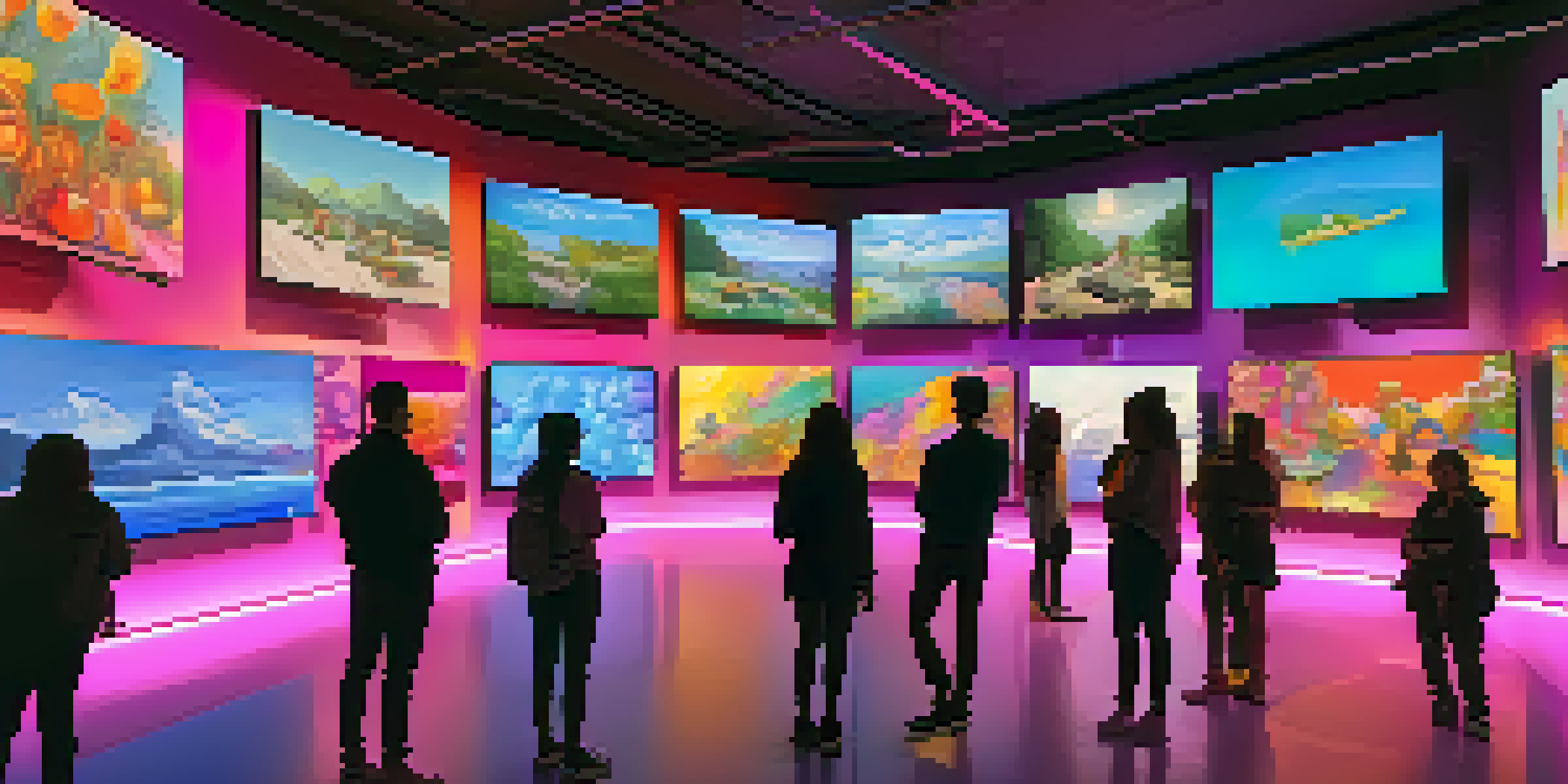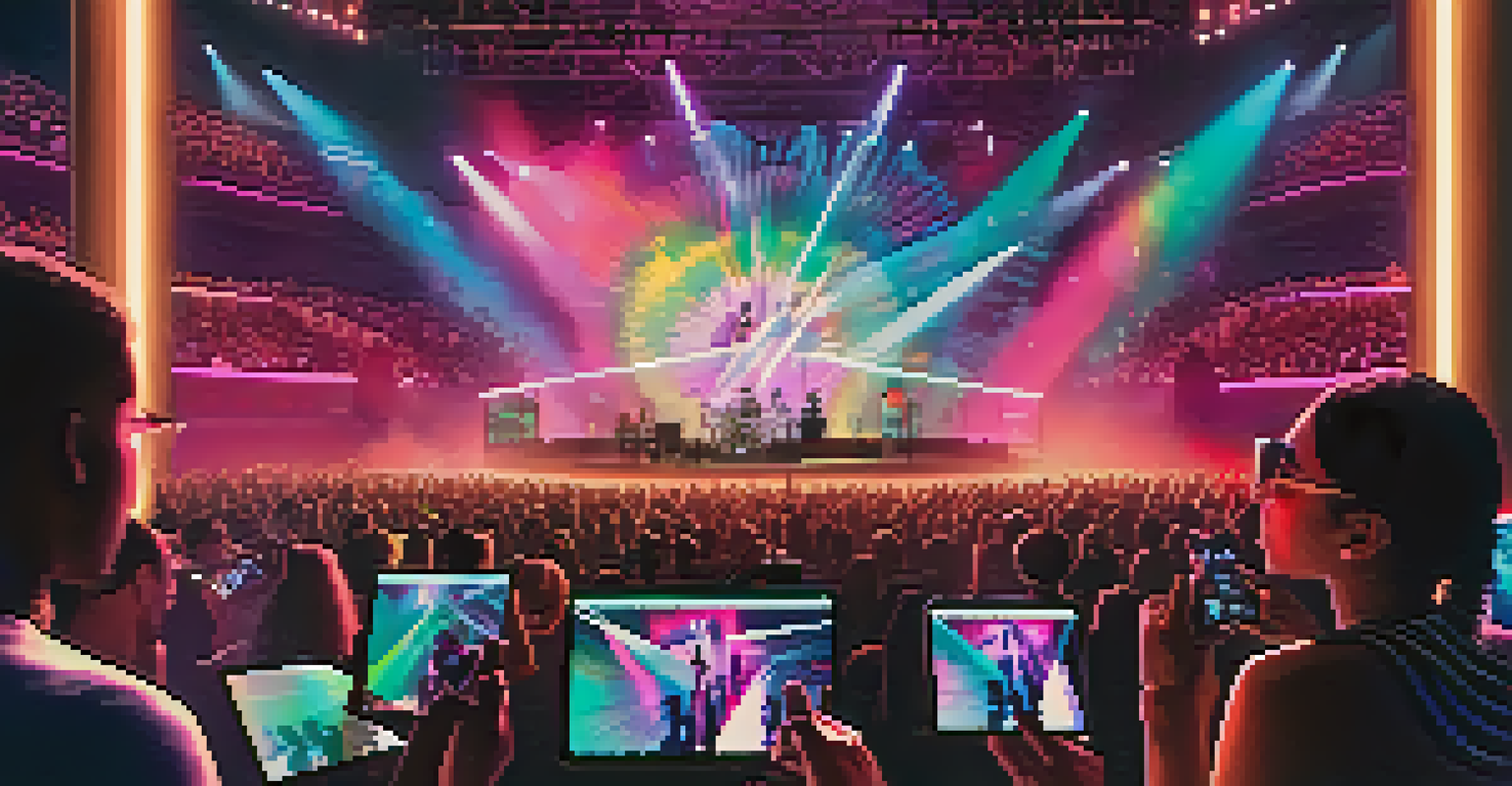How NFTs are Changing the Landscape of Music Ownership

Understanding NFTs: The Basics of Ownership in Digital Art
NFTs, or non-fungible tokens, are unique digital assets that represent ownership of a specific item, often using blockchain technology. Unlike cryptocurrencies, which are interchangeable, NFTs are one-of-a-kind, making them perfect for digital art and music. This uniqueness allows artists to establish ownership and provenance, similar to owning an original painting.
NFTs are a new way for artists to monetize their work and connect directly with their fans.
For musicians, NFTs provide a new way to sell their work directly to fans, bypassing traditional distribution models. Imagine if your favorite band could sell limited edition albums directly to you, complete with exclusive content or experiences. This direct-to-fan model not only empowers artists but also creates a more personal connection between them and their audience.
Moreover, NFTs can include smart contracts that automate royalty payments, ensuring that artists receive fair compensation every time their work is sold or resold. This innovation is a game-changer in an industry where artists often struggle to see financial returns from their music.
How NFTs Empower Artists and Provide New Revenue Streams
Traditionally, musicians rely heavily on streaming services and live performances for income, which can be unpredictable and often insufficient. NFTs present a fresh revenue stream, allowing artists to sell limited edition songs, albums, or even concert tickets directly to fans. This shift not only increases potential earnings but also gives artists more control over their work.

Take, for instance, an artist who releases a single as an NFT, coupled with exclusive behind-the-scenes content or a private concert for the buyer. These unique offerings can significantly enhance the value of the NFT and create a more engaging experience for fans. By crafting exclusive content, artists can foster loyalty and strengthen their fan base.
NFTs Redefine Artist Revenue Streams
NFTs provide musicians with new income opportunities by allowing them to sell unique digital assets directly to fans.
Additionally, NFTs allow artists to earn from secondary sales. Whenever an NFT is resold, a percentage can automatically go back to the original artist, ensuring they continue to benefit financially from their creations. This innovative approach redefines the traditional music revenue model, making it more sustainable for creators.
The Role of NFTs in Fostering Fan Engagement and Community
NFTs offer a unique opportunity for artists to engage with their fans on a deeper level. By purchasing an NFT, fans often gain access to exclusive content, early releases, or even direct communication channels with the artist. This creates a sense of community and belonging among fans, making them feel more connected to the music they love.
The future of music ownership will be defined by how artists and fans engage with each other through innovative technologies.
For example, an artist might release an NFT that gives fans VIP access to virtual meet-and-greets, allowing for personal interactions that traditional platforms can't offer. This not only enhances the fan experience but also builds a loyal community around the artist. Fans feel valued and appreciated, which can translate into greater support for the artist's future projects.
Moreover, such engagement can lead to collaborative projects, where fans can contribute ideas or even co-create content with their favorite artists. This collaborative spirit enriches the music creation process and fosters a vibrant ecosystem where artists and fans thrive together.
Challenges and Controversies Surrounding Music NFTs
Despite the exciting potential of NFTs, there are challenges and controversies that come with their rise in the music industry. Concerns about environmental impact due to the energy-intensive nature of blockchain technology have sparked debate among artists and fans alike. Many are questioning whether the benefits of NFTs outweigh their ecological footprint.
Additionally, the NFT space is still relatively new, leading to uncertainty and a lack of regulation. Artists may find themselves navigating a complex landscape filled with scams and misinformation. This highlights the need for education and awareness within the community, ensuring that artists and fans understand the risks involved before diving into the NFT market.
Enhanced Fan Engagement Through NFTs
By purchasing NFTs, fans gain exclusive access to content, creating a deeper connection with artists and fostering a sense of community.
Furthermore, not all artists have the same access to technology or the resources needed to create and market NFTs effectively. This disparity can exacerbate existing inequalities in the music industry, making it crucial for the community to address these issues and work towards a more inclusive approach to NFT adoption.
Exploring Real-Life Examples of Music NFTs in Action
Several artists have successfully embraced NFTs, demonstrating the transformative power of this technology in the music world. For instance, musician Grimes made headlines by selling a collection of digital artworks and music as NFTs, earning millions in just a few minutes. This high-profile sale showcased the potential for artists to leverage NFTs for significant financial gain.
Another notable example is Kings of Leon, who became the first band to release an album as an NFT. Their album, 'When You See Yourself,' included unique perks such as exclusive audiovisual art and special vinyl versions. This innovative approach not only generated buzz but also opened up new avenues for artistic expression and fan interaction.
These examples illustrate how NFTs can redefine the music landscape, offering a new way for artists to monetize their work while providing fans with unique and engaging experiences. As more artists explore this space, we can expect to see further innovation and creativity emerge in the music industry.
The Future of Music Ownership: Where NFTs Are Heading
As the music industry continues to evolve, the future of music ownership with NFTs looks promising yet uncertain. The ongoing development of technology and platforms will likely lead to more accessible and user-friendly NFT marketplaces. This could encourage even more artists to explore NFTs as a viable avenue for sharing and monetizing their music.
Moreover, as consumers become more familiar with NFTs, we may see a shift in how music is valued. Instead of viewing music purely as a product, fans might start to appreciate it as a collectible experience. This change in perspective could lead to a more sustainable ecosystem where artists and fans work together to support one another.
Challenges of NFTs in Music Industry
Despite their potential, NFTs face challenges like environmental concerns and unequal access, which need addressing for sustainable growth.
However, the success of NFTs in music will depend on addressing the challenges mentioned earlier, such as environmental concerns and accessibility. By fostering an inclusive environment and promoting education about NFTs, the music industry can pave the way for a more equitable and innovative future.
Conclusion: Embracing the Potential of NFTs in Music
NFTs are undeniably changing the landscape of music ownership, offering artists new ways to connect with fans and monetize their work. This technology not only empowers creators but also fosters a sense of community among music lovers. As we continue to explore the potential of NFTs, it’s essential to remain aware of the challenges they present and work towards solutions.
By embracing the opportunities NFTs offer while addressing concerns, the music industry can create a more equitable and sustainable future for artists and fans alike. The journey is just beginning, and the possibilities for innovation are boundless. As we move forward, it’s exciting to think about how music ownership will evolve in this new digital frontier.

Ultimately, the rise of NFTs represents a shift in the way we think about music, art, and ownership. By supporting artists in this transition and engaging with the NFT space thoughtfully, we can all play a part in shaping the future of music.